Transport is a major construction cost; the further the delivery, the greater the cost. Take the case of bricks and blocks. If the building site i
Transport is a major construction cost; the further the delivery, the greater the cost.
Take the case of bricks and blocks. If the building site is close to the brick plant transport costs are bearable. But when the blocks are needed in remote or inaccessible locations, transport becomes the major cost component.
A solution to this problem is at hand. Rather than delivering bricks and blocks at prodigious cost it is now possible to produce them on site with the Click Brick™ system, a fully automated and portable brick and block making plant.
Designed and manufactured in South Africa by Machinecorp Industrial (Pty) Ltd, Click Brick™ plants are housed in shipping containers which are easily transported to site. Moreover, they produce specially designed interlocking bricks and blocks which don’t require mortar.
Instead, the blocks are cast with ridges and furrows, allowing them to slot into each other in a similar fashion to Lego blocks and accelerating construction times by a factor of two. The blocks are also cast with two vertical cavities which means less weight, easier handling and better thermal properties, and, if needed, the cavities can be filled with concrete for door and window frame support.
Click Brick™ plants are available in two models, the M1 which produces an average of between 1 500 to 2 000 masonry units per eight-hour cycle in a 6m container, and the M2, which produces up to 4 000 masonry units per eight-hour in a 6m container.
Unlike other portable brick making plants which are labour intensive, a Click Brick™ plant only requires two-to-three operators. What’s more it only uses two materials, soil and cement in a ratio of 90% soil to 10% cement, to produce blocks with a compressive strength of 6-7MPa. In most instances, suitable soil is sourced on site which translates to considerable delivery-cost and carbon-footprint benefits.
Click Brick™ containers are fully equipped to begin production within two hours of delivery to site and, where necessary, operational training can be provided.
Comprising a six-metre standard shipping container with double doors at either end, both models house a generator, rotary sieve, mixer, conveyor and casting machine. They also come with shovels, brick cutter, diesel jerry can, cement container and a compressive strength tester. And there is enough room to accommodate a bobcat for digging and feeding soil into the plant and for conveying cast blocks to the curing yard.
Joachim Kofahl, Machinecorp founder, managing director, and Click Brick™ inventor, says Click Brick™ blocks are ideal for affordable housing schemes and for rural areas where bricks are either unavailable or prohibitively expensive.
“With locally sourced soil often freely available, Click Brick™ facilitates cost-effective on-site brick production. It is also ideal for short-term leasing and is perfect for business start-ups,” advises Kofahl.
A mechanical engineer, Kofahl has had over 30 years’ experience in manufacturing and supplying portable soil and cement-based brick-making equipment. He founded Hydraform, which during his 20-year tenure as CEO, supplied over 6 000 mortar-free soil and cement brick production units into Africa, Argentina, Columbia and India.
Kofahl says that another major advantage of mortar-free walls such as Click Brick™ is that they have a flexibility which makes them considerably more earthquake resilient than conventional brick and mortar walls.
“While I was with Hydraform we designed an earthquake test facility together with the University of The Witwatersrand. It involved placing a 4x4m building onto a testbed to which a 450kw motor was attached. The motor vibrated the testbed simulating an earthquake, and the structure withstood forces up to seven on the Richter Scale. Had the building been constructed with mortar it would have lacked the flexibility to withstand the induced vibratory forces.”
“The Click Brick™ system is being marketed into Africa by Machinecorp and into the rest of the world by our Columbian agent, and we will be presenting the system at a Ukraine re-construction conference in April,” concluded Kofahl.

